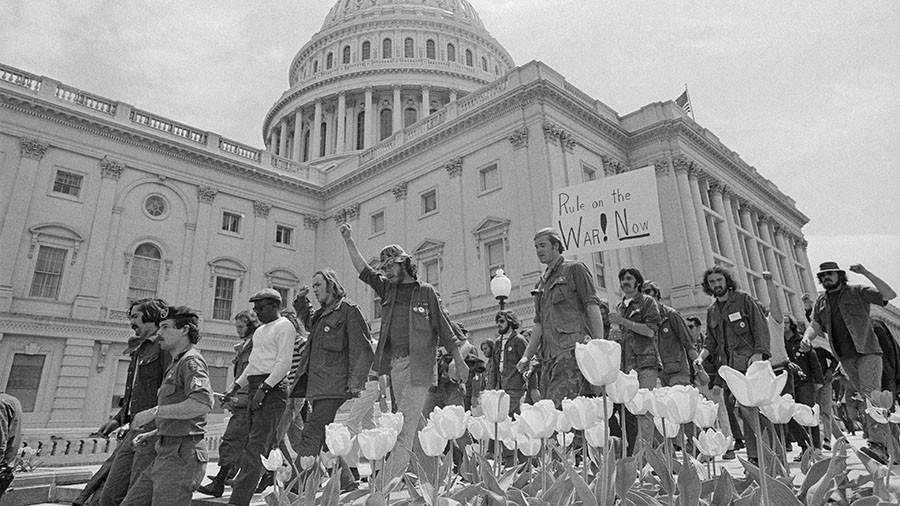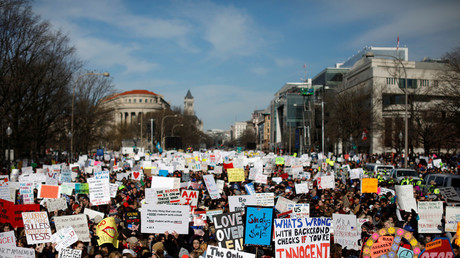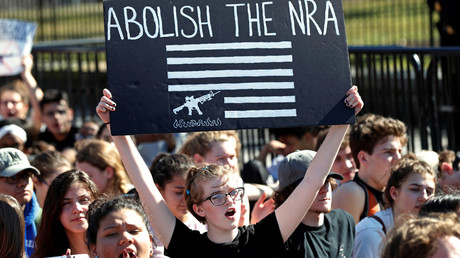America's self-satisfied 'Me Generation' has abandoned the anti-war movement
Robert Bridge is an American writer and journalist. He is author of the book, 'Midnight in the American Empire,' released in 2013. robertvbridge@yahoo.com

Once upon a war, Americans waged large-scale protests against overseas military adventures, even helping to stop the Vietnam War. Today, the spirit of dissent has vanished, replaced by intensely personal issues.
The first months of 2018 demonstrated that the protest movement in the United States is alive and well. In January, millions of women – energized by the Hollywood-inspired #MeToo movement – took to the streets of America to voice their displeasure at Donald Trump's first tumultuous year in the White House, as well as sexual discrimination against females.
In March, another protest rocked America as thousands of protesters – moved by the Parkland high-school shooting, which left 17 people dead in Florida – assembled in Washington, DC in a call for stricter gun control. In light of the disturbing frequency of shooting sprees in the US, it would be wrong to question the importance of such a movement. Yet, however tragic is the sight of innocent Americans being slaughtered by some deranged shooter, those deaths pale in comparison to the number of innocent people being killed in foreign lands as a direct result of US military incursions, many of them absolutely illegal.
So, where were the protests as illicit regime-change operations – in places like Iraq, Libya and now Syria – were systematically destroying the lives of innocent people?
Where was the march on Washington, DC when Barack Obama, in the twilight of his bloodstained presidency, was dropping massive amounts of munitions on numerous countries, all of them in the Muslim world?
"In President Obama's last year in office, the United States dropped 26,172 bombs in seven countries," wrote Micah Zenko of the Council for Foreign Relations. "Most (24,287) were dropped in Iraq and Syria."
How many innocent people – men, women, children – had their lives snuffed out violently and prematurely from such a cavalier attitude towards war, we will never know, nor did many people in the United States challenge their leaders on that question.
This apathetic attitude on the part of so many Americans to this wave of death and destruction against foreigners in foreign lands suggests that any semblance of an anti-war consciousness has left the building. For all intents and purposes, the Democrats and Republicans are essentially of the same mind when it comes to the question of war (in short, it is deemed an altogether positive event, so long as few Americans die). In fact, the reason the 'liberals' as well as factions inside of the Republican Party despise the 'maverick' Donald Trump – who, thanks to his own personal wealth, did not need much outside donations (bribe money) to finance his presidential campaign – is because he threatened to end military entanglements overseas, thus depriving the military industrial complex of untold amounts of blood money.
For anyone who doubts that statement, consider how the liberal media suddenly and sickeningly became Trump's best friend after he unleashed a Tomahawk missile attack against Syria's Shayrat airbase on April 7, 2017 – the first time the US military had attacked Syria's pro-government forces.
Fareed Zakaria, a political commentator with CNN, the US news channel with arguably the worst opinion of the US president, glowed in the after burn of that illicit missile launch against a sovereign state.
"I think Donald Trump became president of the United States last night," Zakaria enthused, hardly able to control his jingoistic juices. "I think this was actually a big moment."
Not to be outdone, MSNBC anchor Brian Williams, shaking his pom-poms for the defense sector, actually called video footage of the missile strike "beautiful."
"We see these beautiful pictures at night from the decks of these two US Navy vessels in the eastern Mediterranean," Williams said. "I am tempted to quote the great Leonard Cohen: 'I am guided by the beauty of our weapons.' And, they are beautiful pictures of fierce armaments making, what is for them, a brief flight over to this airfield."
Only at the end of that psychotic soliloquy did Williams venture to ask: "What did they hit?" Gee, maybe a school? A hospital? Apparently, that was of secondary consideration for the journalist war booster, which strikes me as the ugliest oxymoron of all time.
With this sort of sycophantic reporting and analysis behind every "beautiful" missile launch, is it any wonder the American anti-war movement is nowhere to be found?
There is a real temptation to compare the current state of apathy and indifference of our day to the raucous Vietnam War-era when the streets and, more importantly, the universities became the sight of historic showdowns against the government. The high point of that protest movement came on May 4, 1970 when students at Kent State University came under fire by members of the Ohio National Guard during a mass anti-war gathering. Four students were killed and nine wounded in the melee. Eventually, hundreds of university campuses across the country joined the movement that witnessed violent and non-violent protests involving more than four million students.
Compare that impassioned anti-war spirit, which seems right at home with institutions of higher learning, to the current sad state of universities. Today, students are actually breaking out in violent protest whenever some controversial guest speaker visits their campus to deliver a speech on a topic they find offensive. With this sort of aversion to healthy debate and discussion, it is almost impossible to imagine the university being the source of an anti-war awareness any longer.
There is also a bit of a helpless feeling, especially following the attack on Iraq in 2003 by US-led forces and despite massive anti-war protests, that the people are powerless to effect any real change.
"What's missing is any sense of connection to the government, any sense that it's 'ours' or that we the people matter," Tom Engelhard wrote. "In its place… is the deepest sort of pessimism and cynicism about a national security state and war-making machine beyond our control. And why protest what you can't change?"
Admittedly, much of the indifference to these military adventures could stem from the new nature of warfare. In the Vietnam era, for example, much of the fighting was done on the ground, in the jungles, and many more US soldiers were dying. At the same time, a military draft threatened to call up thousands of new recruits from the general population. In other words, many Americans felt a real threat, a real reason, to protest the war. Much like the Vietnamese, their lives were at stake.
The tragic irony is that today, with so much media and social media at our fingertips, we are better informed than ever. Yet we are discovering that the ability to access information, with the possibility of holding the 'powers that be' to account for their actions, does not necessarily mean that it will happen. In fact, most people today, especially the youth, are so overloaded with information that what our military is doing overseas seems to be the least of their concern. After all, there are so many Facebook posts to check, so many selfies to snap, so many messages to tweet. And anyways, war is something that happens to foreign people, probably some terrorists, who probably deserve what they are getting. After all, America, the 'exceptional nation,' would never attack innocent people for an imperialist agenda. Right?
The statements, views and opinions expressed in this column are solely those of the author and do not necessarily represent those of RT.





0 Comments:
Post a Comment
Subscribe to Post Comments [Atom]
<< Home